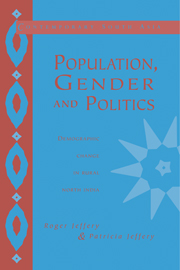Book contents
6 - Fighting with numbers
Published online by Cambridge University Press: 07 January 2010
Summary
I have three sons – the third came in the foolishness of looking for a girl. I will try to educate them all to MA level in the hopes they will get service. It doesn't matter if they all go away to work, I can always employ someone to do the farm work. Unless they get a good job, what benefit will there be from the education? Fortunately, my wife can supervise the children's study; I myself don't have the time.
(ROGER:) Why did you want a girl?)First to help her mother in the house, before she is married; secondly because if there is any work to be done (like getting a glass of water or some food) a girl will never refuse but a son will; also a daughter is needed for me to get the merit of giving a daughter in marriage.
(ROGER:) Why not have only one son, then he would get all the land?)Like I said, I need more than one in case that one son is bad.
(ROGER:) Why not have many more sons?)Yes, that would be good for making the country strong; and would be important, for example in fighting, like against the Muslims, because their population is growing faster. But children are too expensive: the everyday costs are so high I couldn't afford any more.
(Charan h/o Chitra, J24, middle peasant)Questions of population size enter into political discussions in various ways in India.
- Type
- Chapter
- Information
- Population, Gender and PoliticsDemographic Change in Rural North India, pp. 212 - 253Publisher: Cambridge University PressPrint publication year: 1997



